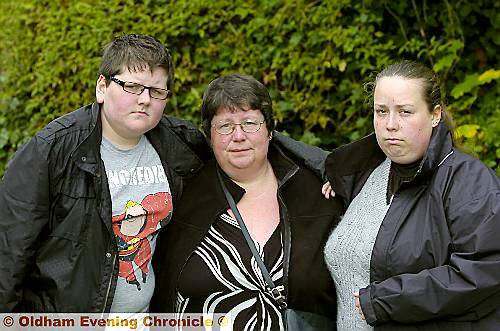Family wants lessons learned on allergy death
Reporter: BEATRIZ AYALA
Date published: 12 August 2010
THE heartbroken family of a teenager who died after suffering a reaction to a late-night snack wants lessons to be learned by the ambulance trust that treated him.
Christopher Gould (14), whose ambition was to be a surgeon, died in July, 2008, after suffering a severe anaphylactic reaction after eating a cashew nut.
The family suffered a second tragedy 11 months later when his father Jim Gould, a teacher at Breeze Hill School and an Oldham Cricket Club stalwart, died suddenly.
The original inquest on Christopher in November, 2009, was adjourned following concerns raised by his family over the treatment by paramedics from North-West Ambulance Service (NWAS).
But at the resumption of the inquiry yesterday, Oldham coroner Simon Nelson recorded a verdict of misadventure and said he was satisfied the care given to Christopher was appropriate.
Christopher, a pupil at Our Lady’s RC School, Royton, ate the nut at about 11.30pm on July 24, 2008. His tongue swelled up, his speech became strange and he became distressed.
His sister Joanna Hibbert said her brother, who was asthmatic, had previously eaten nuts and cashew nuts on several occasions with no reaction.
An ambulance went at the family home in Helmshore Avenue, Moorside, at 11.58pm before leaving for the hospital at 12.20am, but Christopher suffered cardiac arrest as it reached the Royal Oldham Hospital at 12.26am. A post-mortem examination recorded a cause of death as acute anaphylactic reaction.
Paramedic Terence Taylor said that after arriving at the house, he first gave Christopher oxygen before giving him a 500 microgram injection of adrenaline at 12.04am and again at 12.09am while a colleague took two attempts to insert a cannula, or tube, into his hand.
Christopher’s sister, Joanna, queried the length of time the paramedics had spent at the house.
Mr Taylor said the ambulance service only administered adrenaline by breaking a glass ampoule and drawing it into a syringe, and said the adrenaline could not have been administered any earlier.
He added that with hindsight, he would not have changed any clinical decision made.
Adrian Conboy, professional development manager paramedic for NWAS, said the time the ambulance had spent at the family home was acceptable and reasonable given the circumstances of this case.
He said spending time putting in a cannula was to ensure fast access to lifesaving drugs via his veins should Christopher arrest while on the way to the hospital.
Summing up, Mr Nelson said: “I don’t believe there was anything else the paramedics could have done during that relatively short period where Christopher was in their care.
“The protocol was adhered to in all respects.”
He added that even so, it did not stop NWAS thoroughly investigating any additional care that could have improved the situation and possibly avoided Christopher’s death.
Speaking afterwards, Joanna said: “No one has apologised and that is what we wanted. We want the North-West Ambulance Service to take note of what has happened.”
Mrs Gould said: “All it takes is for lessons to be learned. I just don’t want this to happen to anyone else. I’ve still lost my son and I just want him back.”
Most Viewed News Stories
- 1You can score free tickets to a Latics game while supporting Dr Kershaw’s Hospice
- 2Tributes paid following death of hugely respected Oldham community figure Dale Harris
- 3Primary school in Uppermill considers introducing new ‘faith-based’ entry criteria to tackle...
- 4Public inquiry announced into rail upgrade that could leave villages ‘cut off’ for months
- 5Trio arrested, drugs and weapons seized following Chadderton raid





